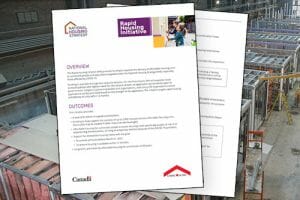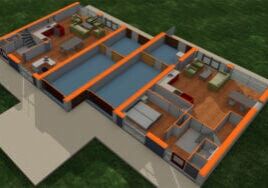$1 Billion Hits the Streets to Fund Canadian Modular Rapid Housing Initiative
For the past two years, MBI and our members have been working with the Canadian Mortgage Housing Corporation (CMHC) to open up opportunities for modular social housing projects in Canada. The challenge, according to CMHC, is that “modular does not fit our traditional underwriting and financing profile.”

MBI has been able to work with CMHC to develop new underwriting guidelines specific to modular projects. Based on a late-October call with CMHC, those guidelines are expected to be available and in force by the end of 2020. But the bigger news for the industry is the recent announcement by CMHC about their “Rapid Housing Initiative (RHI).”
The Government of Canada, through CMHC, has launched the RHI as a $1 billion program utilizing only modular construction to help address urgent housing needs of vulnerable Canadians, especially in the context of COVID-19, through the rapid construction of affordable housing. The initiative provides capital contributions (upon signing a funding agreement with CMHC) under two streams to expedite the delivery of affordable housing.
The RHI will:
- Support the creation of up to 3,000 new permanent affordable housing units.
- Cover the construction of modular housing, as well as the acquisition of land, and the conversion/rehabilitation of existing buildings to affordable housing.
- Aim to commit all funds before March 31, 2021, and ensure housing is available within 12 months of agreements.
Applications for projects must be submitted by cities in partnership with a developer/builder by December 31, 2020.
RHI will deliver funding under two streams, each containing $500 million in available funds. Under the first stream, RHI will expedite funds to pre-identified municipalities with the highest level of renters in severe housing need and people experiencing homelessness. For the second stream, an application portal will be open to municipalities, provinces and territories, Indigenous governing bodies and organizations, and non-profit organizations where applications will be prioritized based on the strength of the application.
MBI has put together a directory of Canadian manufacturers for the express purpose of helping decision-makers locate qualified modular companies with whom to partner.
MBI is also reaching out directly to the pre-identified municipalities to offer resources and assistance to help ensure these modular projects are successful. If you are interested in participating in this housing initiative, please visit this page for more details: https://www.cmhc-schl.gc.ca/en/nhs/rapid-housing-initiative
MBI has identified the multifamily, social/affordable housing sector as one of the greatest growth opportunities for the industry. This work with CMHC dovetails with the recently completed work MBI did with Fannie Mae in the development of their Multifamily Modular Construction Toolkit.
Special thanks to MBI member Joseph Kiss of Horizon North for his assistance on this effort.
More from Modular Advantage
DORÇE Navigates Mountainous Terrain, Extreme Weather to Help Rebuild Türkiye
The February 6 earthquakes in 2023 were enormous. In response, DORÇE moved quickly, obtaining a government bid to help create housing and multipurpose structures—both temporary and permanent—for earthquake victims and laborers hired for reconstruction efforts.
Modern Desert Oasis: Building Reset Hotel the Modular Way
While the off-site construction part of the Reset Hotel project has been carefully controlled and with every necessity close at hand at BECC Modular’s factory in Ontario, Canada, the remote location of the project site has created additional challenges for the on site portion of the build.
Revisiting Yellowstone Canyon Village—a Groundbreaking Modular Construction Feat—Ten Years On
With such a short building period due to impending cold, it made the most sense for park developer Xanterra to pursue modular. Yellowstone’s high visitor traffic also required some odd transportation scheduling, as traffic from the West Yellowstone entrance determined the times when trucks could unload modules. Guerdon was up to the challenge.
Built for Brutal Cold, This Modular Office Building Shines
Houlton, the county seat of Aroostook County, Maine, is a small town with a population of about 6,000 residents. Situated along the border between the U.S. and Canada, what the town is most known for is bitterly cold winters. When the U.S. Border Patrol needed new office space, a modular building approach from Modular Genius offered the perfect solution.
Panel Replacement Adds Years of Life to Navy Vessel
Panel Built, Inc., recently replaced all the wall and roof panels on a two-story US Navy barge deck house that the company had originally installed 30 years ago, giving the vessel new life. Now, the commanding officer of the unit that uses the barge said the difference between the condition and appearance from when the barge left their facility to when the project was complete was beyond his expectations of what was possible.
True Modular Building Seeks to Revolutionize Housing. It’s Next Stop: MBI’s World of Modular Europe
True Modular Building (TMB) specializes in crafting attainable, eco-friendly, and comfortable build-to-rent (BTR) housing with modern designs and customizable features, ensuring that residents feel at home both today and tomorrow.
From Toronto to Suriname: A Global Modular Building Story
When I AM Gold – a Canadian gold mining operation based in Toronto, Ontario – wanted to expand its mining operations in Suriname, it knew it would also need to expand its infrastructure. More specifically, they needed to build a mechanical services compound that would allow their local crews to maintain and equipment critical to their mining operations. They also knew that it would be a challenge.
There Were a “Sea of Challenges” for this Modular, Island Development
Question: Can modular construction be used to build a series of affordable, unique housing buildings, all styled to look like they were built in 1845, on an
island that caters to the wealthy? The answer is, of course, yes, but how the
team at Signature Building Systems and KOH Architecture got there is quite a story.
America’s Construction Economy: A Race Against Time
If the economy has been able to handle higher interest rates thus far, undoubtedly it will be able to manage the lower interest rates to come. But many economists are pointing out that the Federal Reserve may already be too late to the game. While they gradually reduce interest rates, the U.S. economy could quickly decelerate, at least based on theoretical grounds if not on the most recent data releases, culminating in that long-predicted recession. Only time will tell.
Top Five Benefits of Modular Office Space
Modular office spaces are transforming how businesses think about their work environments. These innovative structures offer a mix of flexibility, efficiency, and sustainability, making them a smart choice for companies looking to gain an advantage.










